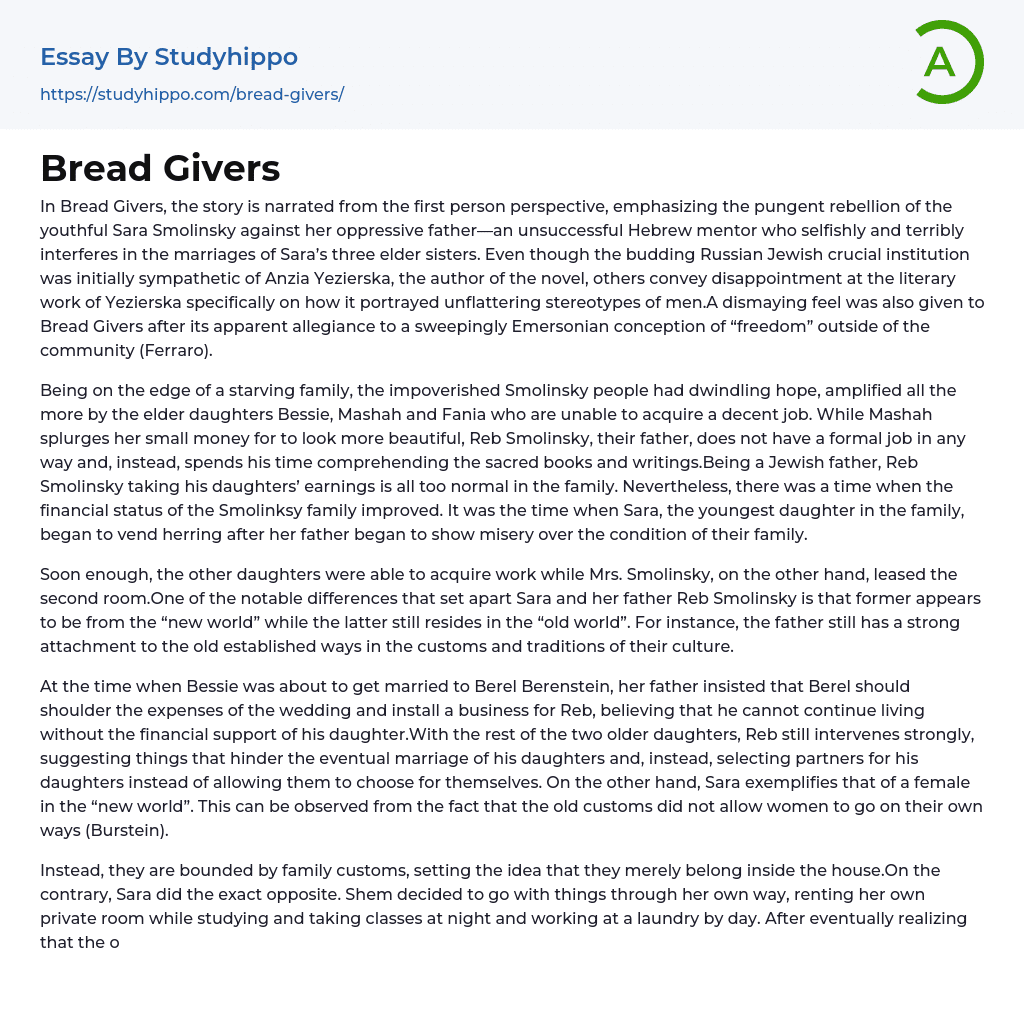In her novel Bread Givers, Anzia Yezierska employs a first-person narrative to showcase Sara Smolinsky's fierce opposition to her tyrannical father, an unsuccessful Hebrew teacher who interferes in the marriages of Sara's three elder sisters. While initially garnering support from the emerging Russian Jewish community, some were dissatisfied with how the book propagated negative stereotypes about men. Additionally, there was backlash against the novel for promoting an Emersonian concept of "freedom" that exists outside the community, which many found disheartening (Ferraro).
The impoverished Smolinsky family was on the verge of starvation, and their hope was dwindling. This was amplified by the fact that Bessie, Mashah, and Fania, the elder daughters, were unable to find decent jobs. While Mashah spent her limited income on trying to look more beautiful, their father Reb Smolinsky
...had no formal job and spent his time studying sacred books. As a Jewish father, it was normal for Reb Smolinsky to take his daughters' earnings. However, there was a time when the family's financial status improved. This was when Sara, the youngest daughter, started selling herring after her father expressed sadness about their situation.
While the other daughters found employment, Mrs. Smolinsky rented out the second room. Reb Smolinsky, Sara's father, holds on to old traditions and customs from the "old world", while Sara seems more adapted to the "new world".
During the time of Bessie's impending marriage to Berel Berenstein, her father demanded that Berel foot the bill for the wedding and also set up a business for Reb. This was because Reb believed he could not sustain his lifestyle without his daughter's financial support. Despite the objections of his two older daughters, Reb
continued to dominate and interfere with their potential life partners, disregarding their own choices in the matter. Conversely, Sara embodies the values of a woman in the "new world", where women are free to make their own decisions. This is a stark contrast to traditional customs that previously restricted women from pursuing their own paths (Burstein).
Sara defied familial traditions and the notion of being restricted to domestic life by opting for a distinct route. She leased a personal chamber, labored at a laundry during daytime, and attended classes at night-time. By adhering to her own principles, Sara comprehended that gaining fiscal autonomy was imperative for triumph. This entailed venturing into unknown territories outside of her comfort zone. Sara regarded education as the key factor in attaining prosperity and committed herself to pursuing it. Her diligence bore fruit when she acquired a scholarship and ultimately graduated from school.
Sara attained financial stability and a decent wage through her job in the New York school system. This newfound success allowed her to purchase better clothes and a larger, cleaner apartment, showcasing her progress in life. She ultimately achieved cultural assimilation after starting as a typical Jewish girl who lived according to the customs and traditions of her culture under the strict control of her father. As she transitioned to living in a foreign country, Sara's experiences mirrored those of young Jewish individuals in the lower East section who fought for an education and thrived as members of American society.
Sara managed to adapt to a new culture, despite coming from a poor Jewish family. She felt like she was in a "new world". During college, Sara aimed to
emulate the fashionable and well-groomed individuals around her. This demonstrates how effectively she assimilated into American society since she initially strove to blend in with the American populace. In the end, Sara pursued a career that is popular among Americans.
Being a teacher in the New York school system has required Sara to integrate into American culture. While she hasn't completely adopted an American identity, she dedicates a considerable portion of herself to comprehending and adjusting to this way of life. Her time in America has enabled her to conquer the obstacles from her youth. Although it was challenging for her to adapt and fit in at first, eventually she overcame those impediments.
Upon her return in the story's conclusion, she brings with her a foreign identity that is contrary to what her father had envisioned for his daughters in Jewish culture. This identity marks a stark contrast to his desires.
- Beef essays
- Beer essays
- Beverages essays
- Bread essays
- Burger essays
- Cake essays
- Coconut essays
- Coffee essays
- Cooking essays
- Crowd essays
- Cuisines essays
- Dairy essays
- Desserts essays
- Dinner essays
- Drink essays
- Fast Food essays
- Favorite Food essays
- Food Safety essays
- Food Security essays
- Food Waste essays
- Fruit essays
- Ginger essays
- Hamburger essays
- Ice Cream essays
- Juice essays
- Lemon essays
- Meal essays
- Meat essays
- Oreo essays
- Organic Food essays
- Pizza essays
- Rice essays
- Sainsbury essays
- Sugar essays
- Taste essays
- Tea essays
- Wine essays




